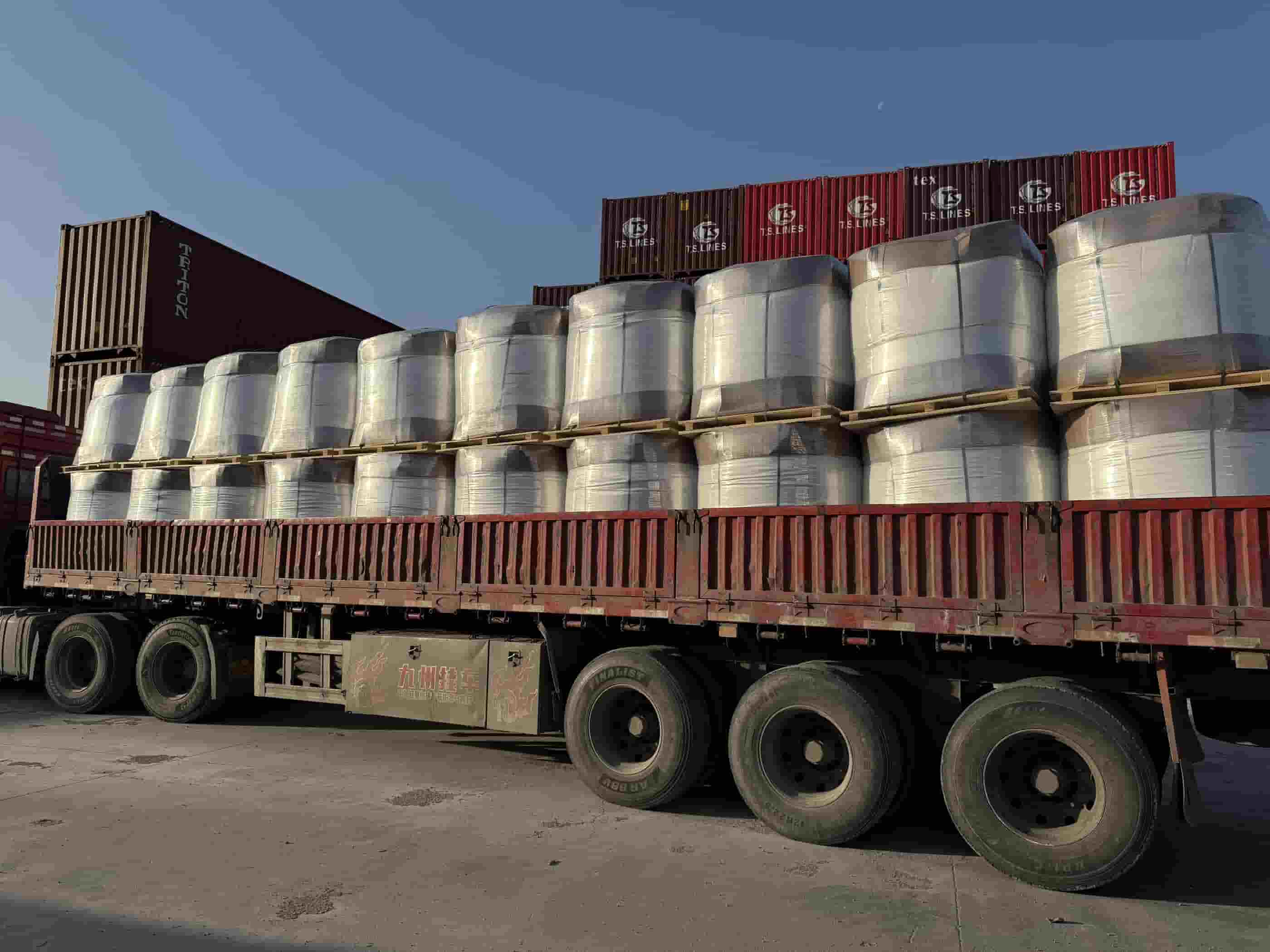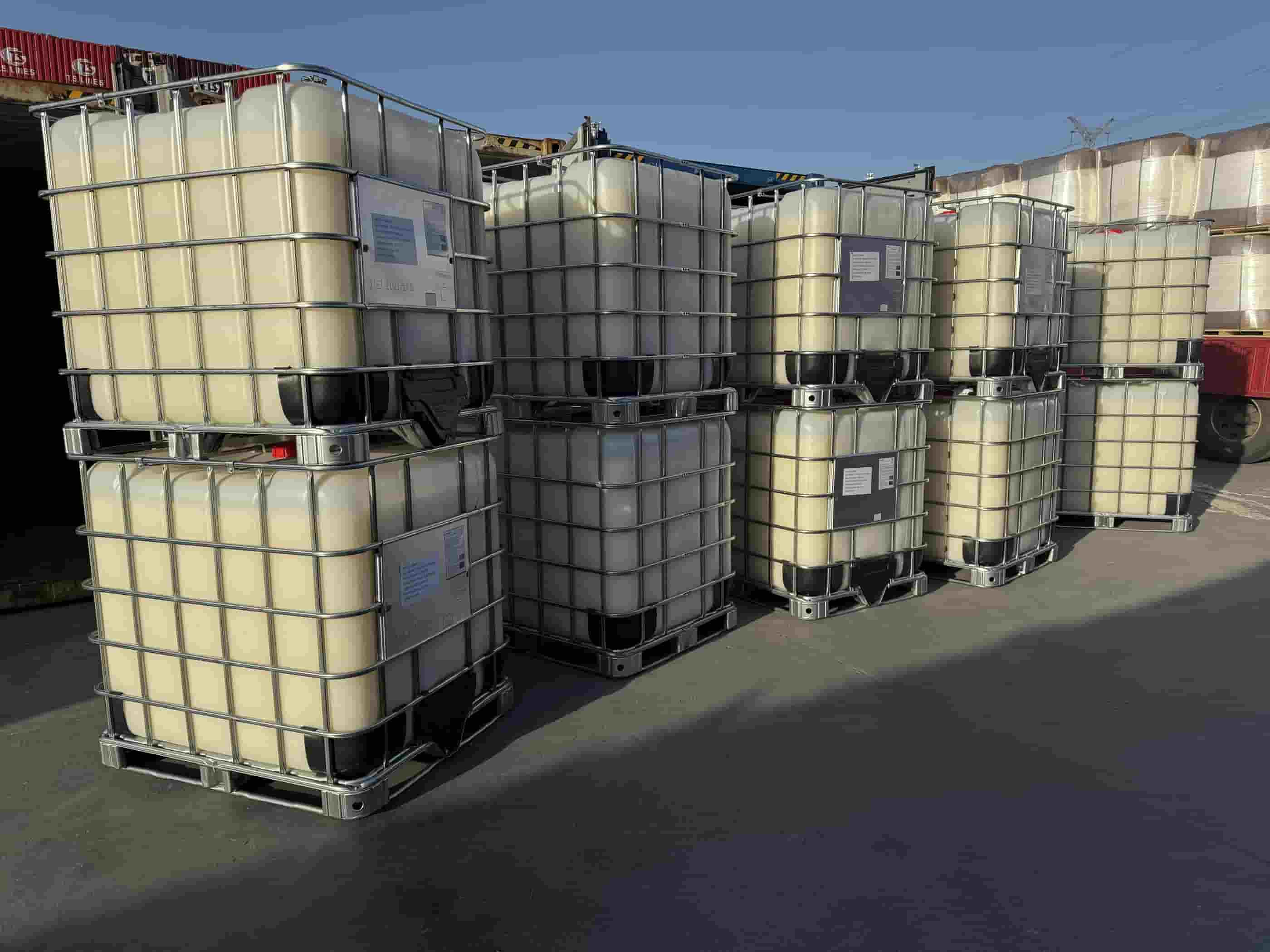Polydiallyldimethylammonium chloride (polydadmac) is a highly effective cationic polymer with a range of industrial applications, owing to its ability to interact with negatively charged particles.
Polydadmac(20-50%solid content) of FL4540 FL4440 can be replaced by Asiafloc Fl SERIES
Material
- polydadmac
Color
- light yellow
Application
- water treatment ,mineral processing ,testile
Certificate
- ISO9001 ,ISO14001
Place of Origin
- China
Other Names
- polydadmac
Brand Name
- asiafloc
Usage
- water treatment ,mineral processing ,textile ,oil and gas
Polydadmac(20-50%solid content) of FL4540 FL4440 can be replaced by Asiafloc Fl SERIES
Polydiallyldimethylammonium chloride (polydadmac) is a highly effective cationic polymer with a range of industrial applications, owing to its ability to interact with negatively charged particles. The polymer's 20-50% solid concentration makes it particularly suitable for high-performance industrial applications, where a moderate to concentrated form of the polymer is necessary. In this range, polydadmac is used across diverse sectors, including water treatment, paper manufacturing, textiles, oilfields, and more. Below is a detailed discussion of its main applications, highlighting how polydadmac (20-50% solid) plays a crucial role in various processes.
1. Water and Wastewater Treatment
One of the most prominent applications of polydadmac (20-50% solid) is in the field of water and wastewater treatment. It acts as a flocculant and coagulant, helping to remove suspended solids, organic matter, and contaminants from water.
Coagulation and Flocculation: In water treatment, polydadmac helps coagulate and flocculate suspended particles, which allows for their aggregation into larger flocs. These flocs can then be removed from the water through processes like sedimentation, filtration, or flotation. Its ability to neutralize the negative charges of particles makes it highly effective in treating various types of water, from industrial wastewater to drinking water.
Industrial Wastewater Treatment: Polydadmac (20-50% solid) is extensively used in treating industrial wastewater from sectors like textiles, paper mills, food processing, and petrochemicals. These industries generate large amounts of wastewater laden with oils, dyes, chemicals, and suspended solids. Polydadmac is particularly effective in removing these contaminants, which are challenging to treat with traditional methods. It improves the efficiency of settling tanks and clarifiers, significantly reducing the total suspended solids (TSS) in the effluent.
Municipal Water Treatment: Polydadmac is used in municipal water treatment plants to purify raw water for human consumption. It helps clarify water by removing turbidity, bacteria, and other pollutants, ensuring that the water meets regulatory standards for drinking. Its use in drinking water treatment is especially important in areas with high turbidity or organic load in the water supply.
Sludge Conditioning: In wastewater treatment, polydadmac can condition sludge, making it easier to remove from the water during dewatering processes. It helps aggregate fine particles in the sludge, improving the performance of dewatering equipment such as centrifuges, belt presses, or filter presses. This results in more efficient handling of sludge and reduced disposal costs.
Removal of Oil and Grease: Polydadmac is highly effective in removing oils and greases from wastewater, especially in industries like food processing, petrochemicals, and manufacturing. Its flocculation properties allow it to aggregate oil droplets, making them easier to separate from water, either by flotation or filtration.
2. Paper and Pulp Industry
Polydadmac (20-50% solid) is a valuable additive in the paper and pulp industry, where it is used to enhance various stages of paper production. Its cationic properties make it an ideal agent for improving paper quality, increasing production efficiency, and reducing environmental impact.
Retention Aid: In the paper industry, one of the primary uses of polydadmac is as a retention agent. During the paper-making process, a large portion of fibers and fillers can be lost in the wastewater. Polydadmac helps retain these materials in the pulp, which increases paper yield and improves efficiency. By binding with fibers and fillers, it prevents their loss and reduces the amount of water that needs to be treated.
Strengthening Agent: Polydadmac is also used to enhance the wet and dry strength of paper products. It improves the bonding between fibers, increasing the overall strength and durability of the paper. This is particularly important for producing high-strength papers, such as those used for packaging, corrugated materials, and newspapers.
Flocculation of Pulp Suspensions: In the paper industry, pulps contain a significant amount of fine particles, which must be removed before further processing. Polydadmac is used to flocculate these fine particles, which helps in their removal and ensures cleaner water for reuse in the papermaking process. This improves the overall efficiency of paper mills and reduces the amount of water used in production.
Deinking in Recycled Paper Production: In recycled paper production, polydadmac plays an important role in the deinking process. It aids in removing ink particles from the fibers, which is crucial for producing high-quality recycled paper. Polydadmac’s flocculation properties allow it to bind with ink particles, facilitating their removal during the washing and pulping stages.
Improving Paper Surface Quality: Polydadmac can also be used in surface treatments of paper to improve its smoothness, printability, and coating properties. It helps enhance the surface quality of the paper, making it more suitable for printing, writing, or coating applications.
3. Textile Industry
In the textile industry, polydadmac (20-50% solid) is used for various applications, from wastewater treatment to enhancing fabric properties. Its cationic nature allows it to interact effectively with dyes, fibers, and other textile chemicals.
Flocculation of Dye Effluents: The textile dyeing process produces large volumes of wastewater containing dyes, chemicals, and suspended solids. Polydadmac is used to treat these dye effluents by aggregating the dye molecules and other contaminants into larger particles. These particles can then be removed more easily through filtration or sedimentation. This helps reduce the environmental impact of textile manufacturing and ensures that effluents meet regulatory discharge standards.
Dye Fixation: Polydadmac is also used in textile dyeing to improve dye fixation on fabrics. Its cationic properties enable it to bind with negatively charged dye molecules, improving the uptake and retention of the dye on the textile fibers. This results in improved color fastness and more consistent dyeing results, which is particularly important for high-quality textiles and fashion fabrics.
Antimicrobial Treatment: Polydadmac has antimicrobial properties due to its positive charge, which makes it effective against bacteria and fungi. It is often incorporated into textile finishes to produce antimicrobial fabrics used in healthcare, sportswear, and other specialized textiles. These fabrics are resistant to microbial growth, extending their lifespan and improving hygiene.
Fabric Softening and Conditioning: Polydadmac is used in textile finishing formulations to enhance fabric softness, texture, and handle. It reduces static buildup and improves the smoothness of fabrics, making them more comfortable to wear. This is particularly beneficial for garments made from synthetic fibers, which tend to feel stiff and uncomfortable without proper conditioning.
4. Oil and Gas Industry
The oil and gas industry uses polydadmac (20-50% solid) primarily in drilling operations and wastewater treatment. Its flocculant properties make it a valuable chemical for improving the efficiency of oilfield processes.
Drilling Fluid Additive: Polydadmac is used as an additive in drilling fluids to enhance their performance. It helps improve the fluid’s ability to stabilize the borehole and reduce friction, which is essential for efficient drilling operations. The polymer also aids in removing cuttings from the wellbore and improving the lubrication of drilling equipment.
Oil-Water Separation: Polydadmac is effective in separating oil from water in various oilfield operations. It helps break emulsions and facilitates the removal of oil droplets from water, improving the quality of the produced water and enabling its reuse or safe disposal.
Produced Water Treatment: Polydadmac plays a crucial role in treating produced water in oilfields. Produced water contains high concentrations of oil, salts, and suspended solids, which must be removed before the water can be safely discharged or reused. Polydadmac helps flocculate these contaminants, making them easier to separate and treat, thus improving the efficiency of produced water treatment systems.
5. Cosmetics and Personal Care
In the cosmetics and personal care industries, polydadmac (20-50% solid) is used for its conditioning and antimicrobial properties, especially in products like shampoos, conditioners, and skincare formulations.
Hair Care Products: Polydadmac is commonly used in shampoos and conditioners to improve the manageability and texture of hair. Its conditioning effect helps reduce static, smoothens the hair cuticle, and makes hair softer and shinier. It is particularly beneficial for individuals with dry or damaged hair.
Antimicrobial Properties in Skincare: Polydadmac’s cationic nature also provides antimicrobial benefits, which can be useful in skincare products such as lotions, creams, and cleansers. It helps prevent bacterial growth, contributing to the preservation of products and providing a clean, healthy skin surface.
Film-Forming Agents: Polydadmac can form a thin, protective film on the skin or hair, providing hydration and enhancing the performance of the product. It is used in moisturizing lotions and hair styling products to improve the sensory properties and efficacy of the formulation.





551.jpg)
